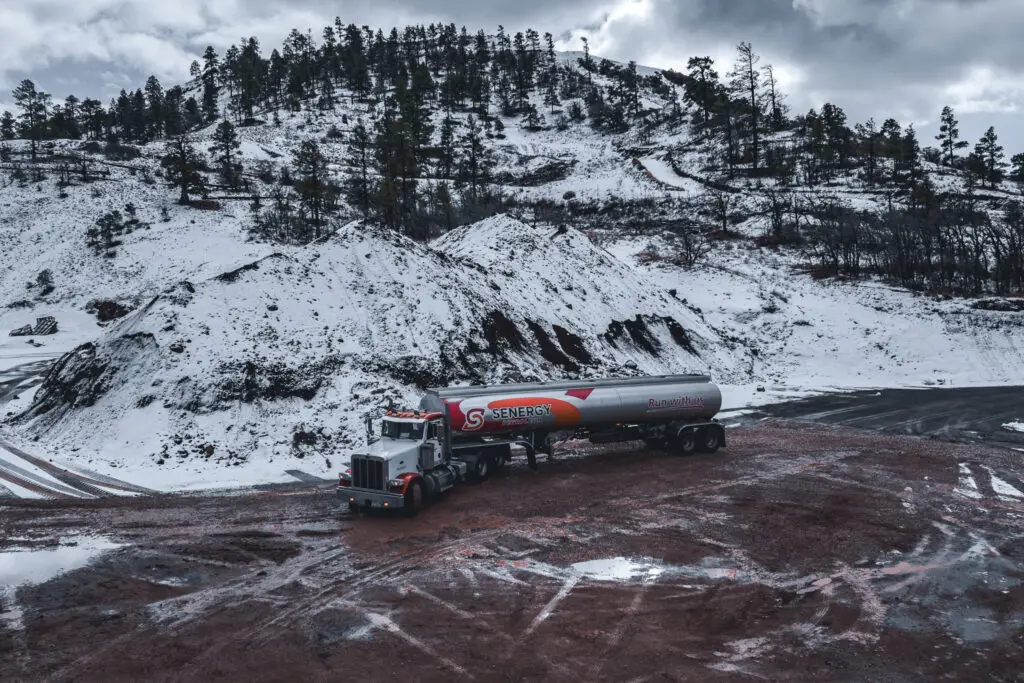Managing heavy machinery or a fleet in the challenging climates of the Southwest and Rockies requires more than just routine maintenance—it calls for smart decisions that impact your bottom line. A crucial decision that often goes unnoticed is selecting the proper antifreeze. While it may seem straightforward, the right choice can significantly affect your equipment’s performance, longevity, and efficiency.
Let’s walk through the key factors that will help you make an informed decision when choosing the right antifreeze for your operations and ensuring your fleet or machinery stays protected.
Antifreeze is more than just a liquid that keeps your engine from freezing in the winter. It’s a vital component that helps regulate your equipment’s temperature, preventing both overheating in the summer and freezing in the winter. It also plays a critical role in preventing corrosion, which can damage vital engine components over time.
When you use antifreeze in your fleet or equipment, you’re not just protecting it from extreme temperatures—you’re also improving performance, extending the lifespan of your machinery, and minimizing maintenance costs. However, choosing the wrong antifreeze or using it incorrectly can result in engine damage, expensive repairs, and even downtime.
There are a few different types of antifreeze available, each suited to specific types of operations and equipment. Let’s break them down:
This is the most commonly used type of antifreeze. It’s effective in a wide range of temperatures, making it perfect for areas that experience both extreme cold and heat. If your equipment operates in harsh environments like the Southwest and Rockies, ethylene glycol might be the best option for you.
Pros:
Cons:
If environmental safety is a concern, propylene glycol is a safer alternative to ethylene glycol. It’s non-toxic, which makes it ideal for use in situations where accidental spills could pose a hazard to animals or plants.
Pros:
Cons:
This is a newer type of antifreeze that combines the best of both worlds: organic acid technology (OAT) and traditional silicate technology. It’s a popular choice for newer vehicles and equipment because it offers better protection against corrosion while being more efficient.
Pros:
Cons:


Now that you know the types of antifreeze, let’s dive into what you should consider when choosing the right one for your operations.
The Southwest and Rockies are known for their extreme temperatures. From scorching summers to freezing winters, choosing antifreeze that can handle these extremes is crucial. If your equipment will be operating in both high and low temperatures, opt for a versatile antifreeze like ethylene glycol, which has a broad temperature range.
Not all equipment is created equal. Whether you’re running a fleet of trucks, bulldozers, or mining equipment, each type of machinery may require different antifreeze properties. For example, modern trucks and heavy machinery typically have specific coolant and antifreeze needs due to newer engine designs and materials, so always check the manufacturer’s recommendations.
Choosing an antifreeze that lasts longer will save you both time and money. Antifreeze typically needs to be replaced every few years, but some formulations, like HOAT, provide extended protection. This reduces the frequency of fluid changes, which can be particularly beneficial for fleets with many vehicles.
Antifreeze often contains additives that help prevent rust and corrosion, as well as increase the fluid’s ability to transfer heat. If you’re running heavy machinery or vehicles that are exposed to tough conditions, antifreeze with additives like anti-foam or anti-corrosion agents will offer additional protection.
Choosing antifreeze isn’t just about picking the most expensive or popular brand. To get the best performance, you’ll need to match the antifreeze to your specific needs:
First and foremost, always consult your equipment’s manufacturer guidelines. They’ll provide the exact antifreeze specifications, including the right type and mixture ratios. Following these instructions is the best way to ensure optimal performance and avoid potential issues.
If you’re managing a fleet, you may need to choose different types of antifreeze for different vehicles. For example, trucks might require a different formula than construction equipment or agricultural machinery. Consider the specific needs of each machine and ensure that the antifreeze you select is compatible with it.
Choosing the right antifreeze is only part of the equation. You’ll also need to regularly check fluid levels and ensure that the antifreeze mixture remains balanced. Over time, the protective properties of antifreeze can degrade, so it’s important to monitor its health and replace it when necessary.
By selecting the right antifreeze, you can avoid costly repairs, reduce the need for frequent fluid changes, and minimize engine damage. The proper antifreeze also helps maintain fuel efficiency, ensuring that your equipment operates at its best.
Using high-quality antifreeze ensures that your machinery is protected from rust, corrosion, and other forms of damage. This can significantly extend the lifespan of your equipment, reducing replacement costs over time.
The right antifreeze doesn’t just protect your engine—it can also improve fuel efficiency. With the correct temperature regulation and reduced wear and tear, your vehicles and machinery will perform more efficiently, saving you money on fuel and repairs.

Choosing the Wrong Antifreeze
Not all antifreeze is the same. Choosing the wrong type for your equipment can lead to overheating, freezing, or even corrosion. Always follow manufacturer recommendations and consider climate conditions.
Forgetting to Monitor Fluid Levels
Once you’ve chosen the right antifreeze, it’s important to check fluid levels regularly. Running your equipment on low or diluted antifreeze can cause significant damage, so make it a part of your routine maintenance.
Ignoring Maintenance Schedules
Antifreeze doesn’t last forever. Even the best antifreeze will degrade over time. Make sure to replace it according to your equipment’s maintenance schedule to keep things running smoothly.
Choosing the right antifreeze is crucial for the efficiency, safety, and longevity of your equipment. With the extreme weather conditions in the Southwest and Rockies, it’s especially important to select a high-quality antifreeze that can handle these harsh temperatures. By considering your equipment type, climate, and manufacturer’s recommendations, you can ensure that your machines stay in top condition year-round.
If you’re unsure which antifreeze is best for your operation, Senergy Petroleum is here to help. Our team of experts is ready to offer tailored recommendations based on your unique needs. Reach out today to learn more about our antifreeze solutions and other fuel services.

